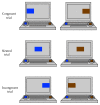Bilingualism and Musicianship Enhance Cognitive Control
- PMID: 26819764
- PMCID: PMC4706931
- DOI: 10.1155/2016/4058620
Bilingualism and Musicianship Enhance Cognitive Control
Abstract
Learning how to speak a second language (i.e., becoming a bilingual) and learning how to play a musical instrument (i.e., becoming a musician) are both thought to increase executive control through experience-dependent plasticity. However, evidence supporting this effect is mixed for bilingualism and limited for musicianship. In addition, the combined effects of bilingualism and musicianship on executive control are unknown. To determine whether bilingualism, musicianship, and combined bilingualism and musicianship improve executive control, we tested 219 young adults belonging to one of four groups (bilinguals, musicians, bilingual musicians, and controls) on a nonlinguistic, nonmusical, visual-spatial Simon task that measured the ability to ignore an irrelevant and misinformative cue. Results revealed that bilinguals, musicians, and bilingual musicians showed an enhanced ability to ignore a distracting cue relative to controls, with similar levels of superior performance among bilinguals, musicians, and bilingual musicians. These results indicate that bilingualism and musicianship improve executive control and have implications for educational and rehabilitation programs that use music and foreign language instruction to boost cognitive performance.
Figures





Similar articles
-
Musical training, bilingualism, and executive function: a closer look at task switching and dual-task performance.Cogn Sci. 2015 Jul;39(5):992-1020. doi: 10.1111/cogs.12183. Epub 2014 Oct 7. Cogn Sci. 2015. PMID: 25289704
-
Musical expertise, bilingualism, and executive functioning.J Exp Psychol Hum Percept Perform. 2009 Apr;35(2):565-74. doi: 10.1037/a0012735. J Exp Psychol Hum Percept Perform. 2009. PMID: 19331508
-
Musical training, bilingualism, and executive function: working memory and inhibitory control.Cogn Res Princ Implic. 2018;3(1):11. doi: 10.1186/s41235-018-0095-6. Epub 2018 Apr 11. Cogn Res Princ Implic. 2018. PMID: 29670934 Free PMC article.
-
Positive Cognitive Effects of Bilingualism and Multilingualism on Cerebral Function: a Review.Psychiatr Q. 2018 Jun;89(2):273-283. doi: 10.1007/s11126-017-9532-9. Psychiatr Q. 2018. PMID: 28895004 Review.
-
Is bilingualism associated with enhanced executive functioning in adults? A meta-analytic review.Psychol Bull. 2018 Apr;144(4):394-425. doi: 10.1037/bul0000142. Epub 2018 Mar 1. Psychol Bull. 2018. PMID: 29494195 Review.
Cited by
-
Does the Bilingual Advantage in Cognitive Control Exist and If So, What Are Its Modulating Factors? A Systematic Review.Behav Sci (Basel). 2019 Mar 13;9(3):27. doi: 10.3390/bs9030027. Behav Sci (Basel). 2019. PMID: 30871228 Free PMC article. Review.
-
Evidence that ageing yields improvements as well as declines across attention and executive functions.Nat Hum Behav. 2022 Jan;6(1):97-110. doi: 10.1038/s41562-021-01169-7. Epub 2021 Aug 19. Nat Hum Behav. 2022. PMID: 34413509
-
Music training is related to late ERP modulation and enhanced performance during Simon task but not Stroop task.Front Hum Neurosci. 2024 Apr 22;18:1384179. doi: 10.3389/fnhum.2024.1384179. eCollection 2024. Front Hum Neurosci. 2024. PMID: 38711801 Free PMC article.
-
Neural signatures of language co-activation and control in bilingual spoken word comprehension.Brain Res. 2017 Jun 15;1665:50-64. doi: 10.1016/j.brainres.2017.03.023. Epub 2017 Apr 1. Brain Res. 2017. PMID: 28372943 Free PMC article.
-
Measuring Bilingualism: The Quest for a "Bilingualism Quotient".Appl Psycholinguist. 2021 Mar;42(Suppl 2):527-548. doi: 10.1017/s0142716420000533. Epub 2020 Nov 11. Appl Psycholinguist. 2021. PMID: 34054162 Free PMC article.
References
Publication types
MeSH terms
Grants and funding
LinkOut - more resources
Full Text Sources
Other Literature Sources

